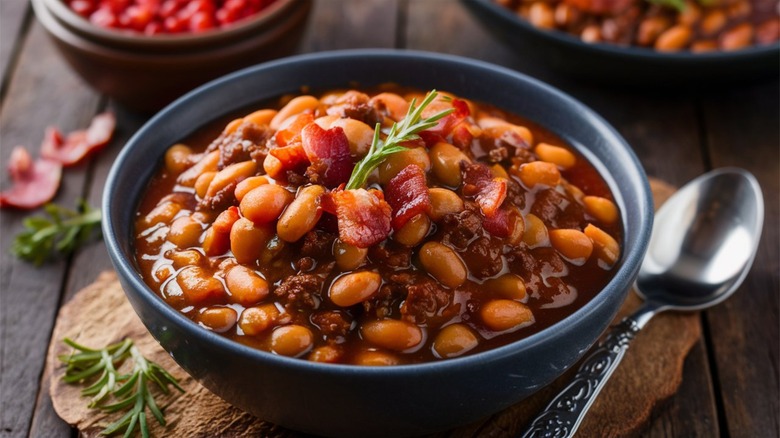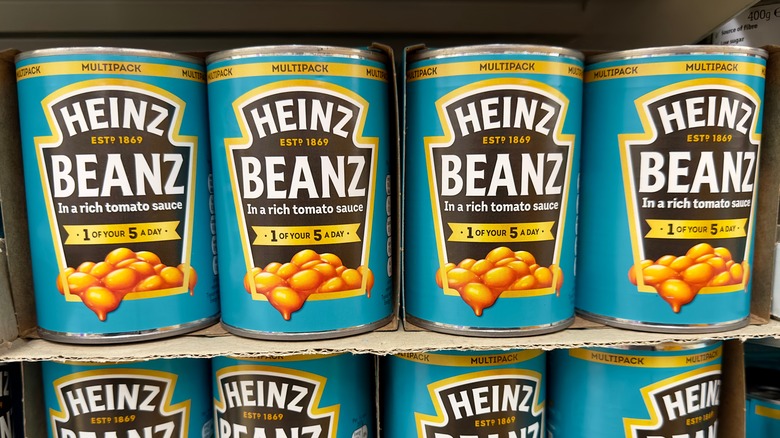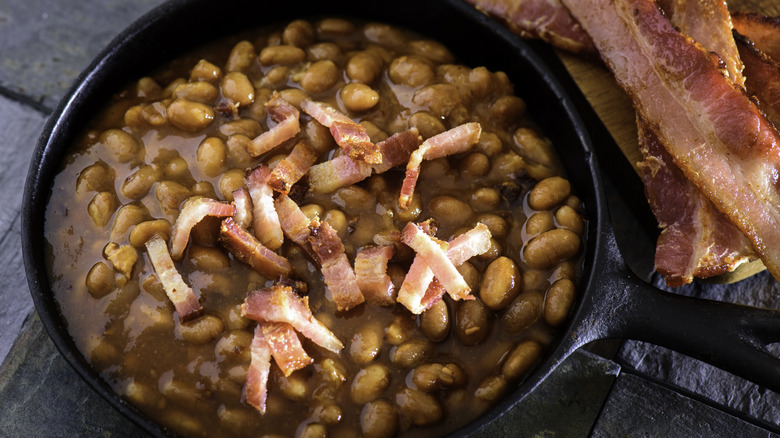The Historic Reason Canned Baked Beans Have Bacon In Them
Classic baked beans are one of those dishes that feel totally well-rounded and fully satisfying. Recipes range in composition, but most have some combination of sweetness from brown sugar or molasses (or both), sustaining protein from the namesake legumes, a little punch from vinegar, subtle spice from mustard, and aromatic complexity from garlic and onion. And then, for some, there is the most important element: the bacon. Rich, umami-packed, and salty, the addition of pork is what seals the deal for a lot of baked bean superfans.
While everyone's favorite baked beans can be made right at home, many folks enjoy the kind they can conveniently pick up from the grocery store, so it's perhaps no surprise that there are quite a few brands out there from which to choose. And while vegetarian options are available, many canned baked beans include that all-important bacon element. The explanation for the presence of this porky favorite goes far beyond flavor, though. In fact, it goes far back — into history. That origin story holds the answer to why bacon wound up in your canned baked beans — but like so many culinary beginnings, the real reason may be up for debate.
Varying accounts
Back in the 1600s, a humble dish designed on the other side of the Atlantic may have been a baked bean predecessor — an adaptable stew known as pottage. Pottage was central to Medieval and Tudor cuisine. While a mess of pottage can be produced from lentils, historically this meal included beans, bacon, and available vegetables, cooked together into a brothy, hearty dish that stretched ingredients and promised sustenance. That said, there's another theory that baked beans may have French roots, thanks to a resemblance to classic skillet cassoulet.
Many historians suspect that the development of the dish had more to do with indigenous American populations though, who were skilled at cultivating beans. Evidence suggests they likely simmered their legumes along with another source of flavor and umami — seaweed. Other accounts indicate that meat was involved in the baking of beans for native people, but that it was bear meat or deer fat rather than pork, and that the eventual introduction of pig meat was British influence (this factor may have also contributed to the switch of favored sweetener from maple syrup to brown sugar — an element that was later again adapted for historical reasons, from sugar to molasses).
Regardless of the dish's creative origins, the original packages — cans of baked beans — were produced in the late 19th century. The first company to introduce baked beans to the grocery scene is debatable, but they were no doubt popularized by a Pennsylvania enterprise called HJ Heinz Company.
Baked beans evolve with the times
It was ideal timing to roll out this new tinned innovation. Canned baked beans got a boost in the 20th century, skyrocketing in the Heinz sales portfolio during The Great Depression and later during World War II when the protein-packed packages offered a convenient and cost-effective form of nutrition (they were even considered an essential food item in the U.K.). During those eras when pricey meat was precious and hard to come by, Heinz had to pause the production of cans that featured bacon, but consumers' taste for beloved pork in beans never disappeared, and those salty little bits later returned to packages.
In the decades since, brands offering canned baked beans have proliferated. Names like Bush's Beans earned their own following by serving up proprietary cans of pork and legumes, among many others. Today, the shelves at your local market likely offer a dozen or so variants, all catering to lovers of this historically delicious dish. And while a can of Heinz Original Beans with Brown Sugar and Bacon is still available to you, and many other varieties do indeed still feature pork (although TikTok users have recently questioned whether the ratio of meat to bean is sufficient), there are plenty of baked bean brands that come meat-free, too. But regardless of how that bacon found its way into your beans, when you pop open a can for yourself you can trust that you're participating in a long and robust legume legacy.


